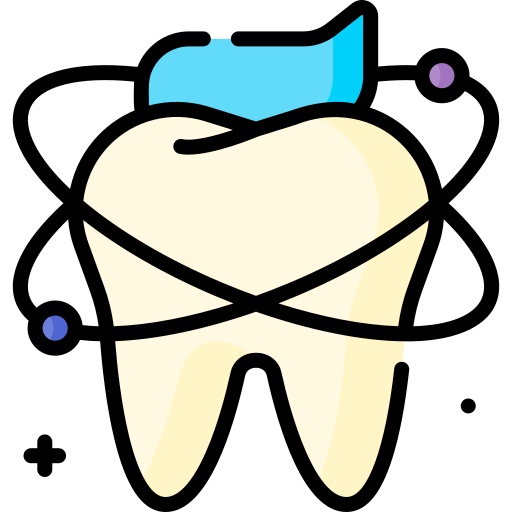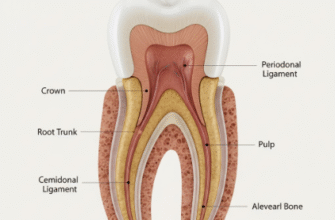Many people breathe a sigh of relief when they get dentures, thinking their days of meticulous oral care are over. “No more teeth, no more brushing, right?” This common thought could not be further from the truth. While dentures certainly replace missing natural teeth, they do not magically eliminate the need for a clean and healthy mouth. In fact, maintaining good oral hygiene with dentures is just as crucial, perhaps even more so, for ensuring comfort, promoting overall health, and extending the longevity of your prosthetic. Let us dismantle this persistent myth and explore why your mouth still needs diligent attention, even with a full or partial set of dentures.
Why Your Mouth Still Needs TLC with Dentures
The idea that dentures mean an end to oral hygiene is a fundamental misunderstanding of how dentures interact with your oral environment. Your mouth is a dynamic ecosystem, and dentures introduce new surfaces and considerations.
Protecting Your Gums: The Foundation
Even without natural teeth in the area covered by a full denture, your gums are living tissue. They form the delicate foundation upon which your dentures rest and rely for support. If bacteria, food particles, and plaque are allowed to accumulate underneath and around your dentures, it is a direct recipe for trouble. This neglect can lead to several uncomfortable and potentially harmful conditions:
- Gum irritation and inflammation: Red, swollen, and tender gums are common early warning signs that something is amiss. The constant presence of irritants can make gums sore to the touch.
- Denture stomatitis: This is a prevalent condition, often caused by an overgrowth of yeast (Candida albicans), presenting as noticeable redness and inflammation of the tissue directly under the denture. It might not always be painful initially, but it signifies an unhealthy environment.
- Painful sores and ulcers: Persistent irritation from trapped debris or an unhygienic surface can lead to the development of painful sores, making the simple act of wearing dentures an ordeal.
Think of your gums as the crucial cushion for your dentures. A dirty, unkempt cushion will inevitably become uncomfortable and can even damage what it is supposed to protect and support.
Caring for Any Remaining Natural Teeth (Partial Dentures)
If you wear partial dentures, the stakes for oral hygiene are even higher. Those remaining natural teeth are not just bystanders; they often act as vital anchors for your partials, providing stability and support. Neglecting them can have serious consequences:
- Preventing tooth decay: Food particles and plaque can easily become trapped around the clasps, connectors, and framework of partial dentures. This creates an ideal environment for acid-producing bacteria, leading to cavities in your supporting natural teeth.
- Avoiding gum disease around natural teeth: Similarly, plaque buildup in these hard-to-reach areas can cause gingivitis (inflammation of the gums) and, if left untreated, periodontitis (a more severe form of gum disease that can lead to bone and tooth loss).
Losing these critical anchor teeth often means you will require a new, potentially different and more complex type of denture. This can involve a more involved fitting process and additional expense. Therefore, protecting these remaining teeth with diligent hygiene is paramount for the success and longevity of your partial denture.
The Unseen Hero: Your Jawbone Health
While you might not directly “clean” your jawbone, your oral hygiene practices with dentures indirectly influence its health over time. The relationship is multifaceted:
- Gum Stimulation: Gently cleaning your gums, even those under a full denture, can provide some beneficial stimulation, which is good for blood circulation in the tissues.
- Maintaining a Proper Fit: More significantly, poor oral hygiene can lead to chronic gum inflammation and subsequent changes in the shape and contour of your gums. These changes can cause previously well-fitting dentures to become loose or unstable. Ill-fitting dentures can rub unevenly and create excessive pressure points on the underlying jawbone. Over time, this can potentially accelerate the natural process of bone resorption (shrinkage of the jawbone). A well-maintained mouth supports a better, more stable denture fit, which in turn is kinder to your underlying bone structure.
Fending Off Unwanted Guests: Infections
Your mouth is naturally a warm, moist environment – a perfect breeding ground for a variety of bacteria and fungi if not kept scrupulously clean. Dentures can inadvertently provide additional surfaces and crevices for these microorganisms to hide and multiply.
- Fungal Infections (Oral Thrush): As mentioned earlier, the yeast Candida albicans can thrive under unhygienic dentures, leading to oral thrush. This infection can cause characteristic white patches on the gums, tongue, or inner cheeks, accompanied by soreness, redness, and sometimes a burning sensation.
- Bacterial Infections: An overgrowth of harmful bacteria can cause various issues, from localized gum infections to more widespread problems if they manage to enter the bloodstream. This is a particular concern for individuals with compromised immune systems or other underlying health conditions.
Consistent and thorough cleanliness of both your dentures and your oral cavity is your primary and most effective line of defense against these unwelcome microbial invaders.
Tackling Bad Breath (Halitosis)
No one wants to be the person whose presence is announced by noticeably bad breath. Dentures, if not cleaned properly and regularly, can become significant culprits in causing halitosis.
- Trapped Food Particles: Microscopic food particles can become lodged in the tiny pores of the denture material itself, as well as in the space between the denture and your gums. As these particles begin to decompose, they release foul-smelling sulfur compounds.
- Bacterial Byproducts: The bacteria themselves, as they metabolize food debris and proteins in your saliva, produce odorous gases. A biofilm, or layer of bacteria, on your dentures or coating your tongue and gums will inevitably contribute to halitosis.
Regular and meticulous cleaning of both your dentures and your entire mouth is essential to keep your breath fresh and socially acceptable.
Keeping Your Dentures in Top Shape for Longevity
Your dentures represent a significant investment in your oral health and appearance. Just like any valuable and frequently used item, they require consistent care to maintain their function, aesthetics, and lifespan.
- Preventing Unsightly Stains: Beverages like coffee, tea, and red wine, as well as certain foods and tobacco use, can stain denture acrylic over time, making them look discolored and old. Regular cleaning helps to minimize this staining and keep your smile bright.
- Avoiding Damage and Buildup: While not strictly hygiene, how you handle your dentures during cleaning is important to prevent accidental breakage. Furthermore, a buildup of hardened plaque (tartar or calculus) on dentures can make them feel rough, attract more plaque, and potentially alter their fit.
Proper care ensures your dentures continue to look good, feel comfortable against your gums, and serve you well for as long as possible, delaying the need for replacements.
The Undeniable Comfort Factor
Ultimately, beyond all the specific health reasons, a clean mouth and clean dentures simply feel better. This contributes significantly to your daily quality of life.
- Reduced Irritation and Soreness: With less bacteria and debris, there is a much lower chance of developing painful sores and chronic inflammation.
- Better Taste Perception: Food simply tastes better when your palate and tongue are not coated with a film of bacteria or lingering old food particles from your dentures.
- Increased Confidence: Knowing your mouth is clean, your dentures are secure, and your breath is fresh can significantly boost your confidence in social interactions, allowing you to smile, speak, and laugh without self-consciousness.
Mastering Denture and Oral Care: A Practical Guide
Understanding why hygiene is important is the first step. The next is knowing how to implement an effective care routine. It is not complicated, but it does require consistency.
Giving Your Dentures a Daily Spa Treatment
Your dentures work hard for you all day; they deserve some dedicated attention each night, along with a good scrub. Here is a typical recommended routine:
- Remove them carefully: Always handle your dentures with care to avoid dropping them, as they can break or warp. It is a good practice to do this over a sink filled with water or over a soft, folded towel to cushion any accidental falls.
- Rinse after eating (when possible): If you have the opportunity, remove and rinse your dentures under running water after meals. This helps to wash away loose food particles before they get a chance to dry and stick. While not always practical when out and about, it makes a big difference.
- Daily, thorough brushing: Use a specially designed soft-bristled denture brush, or a very soft regular toothbrush, along with a non-abrasive denture cleaner. It is crucial to avoid using regular toothpaste on dentures, as most toothpastes contain abrasive particles that can create microscopic scratches on the denture surface. These tiny scratches can then harbor bacteria and contribute to staining. Gently brush all surfaces of the denture, both inside and out, paying attention to grooves and crevices.
- Rinse thoroughly post-brushing: After brushing, rinse the dentures exceptionally well under cool or lukewarm running water. Ensure all traces of the denture cleaner and loosened debris are removed. Avoid using hot water, as extreme temperatures can warp the denture material, affecting its fit.
- Soak them as directed: Most types of dentures need to be kept moist to retain their shape and prevent the acrylic from drying out and becoming brittle. Soaking them overnight in a specialized denture-soaking solution or plain, clean water (always follow the specific advice given by your dentist or prosthodontist) is usually recommended. This soaking also gives your gum tissues a much-needed rest from the pressure of wearing dentures. Always remember to rinse your dentures thoroughly again before reinserting them into your mouth after soaking.
Do Not Forget Your Mouth!
Cleaning your dentures meticulously is only half the job. The health of your gums, tongue, palate, and any remaining natural teeth also requires regular attention.
- Brush your gums, tongue, and palate: Use a very soft toothbrush (a different one from your denture brush) and a small amount of non-abrasive toothpaste, or even just plain water if your gums are particularly sensitive. Gently brush these soft tissue areas every morning and evening. This action removes accumulated plaque, stimulates blood circulation in the gums, and helps to keep your breath fresh.
- Massage your gums gently: Gentle massage can improve blood flow to the gum tissues. You can achieve this with your soft brush during cleaning or by using a clean finger to gently rub the gums.
- Consider rinsing: Rinsing your mouth with an antimicrobial mouthwash, if specifically recommended by your dentist, or even a simple saltwater rinse (half a teaspoon of salt in a cup of warm water) can also be beneficial in reducing bacteria. However, rinsing should be seen as an adjunct to, not a substitute for, mechanical brushing of your tissues and dentures.
- Special care for partial denture wearers: If you wear partial dentures, you must pay extra special attention to brushing and flossing around your remaining natural teeth. Focus particularly on the areas where the denture clasps or framework rest against these teeth, as these are prime spots for plaque accumulation.
Handling with Finesse and Care
A quick but important reminder about taking physical care of your dentures themselves:
- Avoid bending or damaging clasps or delicate attachments when cleaning or handling your dentures. Apply gentle but firm pressure.
- Keep them out of reach of children and pets when they are out of your mouth. Curious pets, in particular, sometimes find dentures to be fascinating (and unfortunately, destructible) chew toys!
Verified Practice: Regular dental check-ups are non-negotiable, even for individuals who wear full dentures. Your dentist needs to meticulously examine your oral tissues for any signs of irritation, infection, or other abnormalities. They will also check the fit and condition of your dentures and perform essential oral cancer screenings. These professional visits are absolutely vital for maintaining long-term oral health and ensuring your dentures continue to serve you effectively and comfortably.
The Ripple Effect: When Denture Hygiene is Ignored
Skipping out on, or being lax with, proper oral and denture hygiene is not just a matter of a little bit of bad breath or some minor, occasional discomfort. The consequences of such neglect can be surprisingly far-reaching, significantly impacting not only your oral comfort but also your overall quality of life and potentially your general health.
The Obvious (and Often Painful) Outcomes
These are typically the first problems to surface when hygiene is poor:
- Pain and Discomfort: This is often the most immediate and noticeable sign. Inflamed, tender gums, the development of painful denture sores (ulcers), and opportunistic infections like oral thrush can make wearing dentures incredibly painful. This can directly affect your ability to eat a varied diet and speak clearly and confidently.
- Persistent Bad Breath (Halitosis): As layers of bacteria and decomposing food debris accumulate on uncleaned dentures and within the oral cavity, they relentlessly produce volatile sulfur compounds. This results in chronic bad breath that even the strongest mints or mouthwashes can only temporarily mask, leading to social embarrassment and a decline in self-esteem.
- Stained and Unsightly Dentures: Neglected dentures will quickly become stained from the pigments in food, beverages (especially coffee, tea, red wine), and, if applicable, tobacco products. They can also develop a noticeable, hard buildup of tartar (calculus), making them look old, unhygienic, and generally unappealing.
More Serious Health Complications
Beyond the immediate discomforts, chronic neglect can lead to more serious oral health issues:
- Denture-Induced Stomatitis: As previously mentioned, this inflammation of the soft tissues directly beneath the denture is very common with poor hygiene and is frequently linked to an overgrowth of Candida yeast. While it may be painless in its early stages, it can progress to cause significant discomfort, a burning sensation, and an increased susceptibility to further infection.
- Angular Cheilitis: These are painful cracks, sores, and inflammation that develop at the corners of the mouth. This condition is often associated with ill-fitting dentures that may allow saliva to pool, or with yeast infections spreading from an unhygienic oral environment and uncleaned dentures.
- Progressive Gum Disease (for partial denture wearers): If you have partial dentures and consistently neglect the hygiene of your remaining natural teeth and the gums surrounding them, you are at high risk for developing gingivitis, which can progress to irreversible periodontitis. This can lead to the loosening and eventual loss of those crucial anchor teeth, necessitating more extensive and costly dental work, such as a full denture or dental implants.
- Potential for Increased Risk of Systemic Issues: While the direct causative link is still an area of active research specifically for denture wearers, poor oral hygiene, in general, is increasingly associated with an increased risk of harmful oral bacteria entering the bloodstream. This bacteremia can potentially exacerbate or contribute to systemic conditions such as cardiovascular disease, respiratory infections (like pneumonia, especially in older or vulnerable individuals), and difficulties in managing diabetes.
- Accelerated Jawbone Resorption: Chronic inflammation of the gums due to poor hygiene can alter their shape. Furthermore, poorly fitting dentures, which can themselves be a result of these gum changes or simply neglect, can put undue and uneven stress on the underlying jawbone. This may accelerate the natural, gradual shrinkage process of the jawbone that occurs after tooth loss, making it progressively harder to achieve a stable, retentive, and comfortable denture fit in the future.
The Financial and Emotional Toll of Neglect
The consequences are not just physical; they can also hit your wallet and your well-being:
- Costly Treatments and Replacements: Treating oral infections, painful sores, and advanced gum disease can involve multiple dental visits, prescription medications, and specialized treatments. If dentures become ill-fitting due to neglected gums or significant bone loss, they may require professional relining, rebasing, or even complete replacement, all of which incur additional costs.
- Reduced Overall Quality of Life: Living with constant oral discomfort, struggling to eat enjoyable and nutritious foods, and feeling self-conscious about your appearance or breath can significantly diminish your overall enjoyment of daily life and social interactions.
Important Warning: Ignoring persistent sores, unusual lumps, white or red patches, or any unexplained color changes in your mouth can be dangerous. While these issues are often related to denture fit or hygiene, they could, in some instances, be early signs of more serious conditions, including oral cancer. Always consult your dentist promptly if you notice any new or concerning changes in your oral health that do not resolve quickly.
The Takeaway: Dentures Are Not a Hygiene Holiday
The pervasive myth that acquiring dentures signals an end to the responsibilities of oral hygiene is not just fundamentally false; it is a potentially harmful misconception. Your prosthetic teeth, whether full or partial, are indeed a fantastic and often life-changing solution for restoring smiles, improving chewing function, and supporting facial structure. However, they come with their own distinct set of care requirements, just as natural teeth do. Embracing and maintaining a consistent, thorough routine of cleaning both your dentures and your entire mouth is absolutely fundamental to your daily comfort, your long-term oral health, and the successful longevity of your dental investment.
Consider this analogy: you would not wear the same set of clothes day after day, week after week, without washing them, would you? Your dentures are in your mouth – a warm, moist environment that is naturally teeming with bacteria – for many hours each day. They are in constant contact with food and saliva. Therefore, they need to be cleaned meticulously and regularly to remove accumulated food particles, bacterial plaque, and other potentially harmful microorganisms.
Similarly, your gums, tongue, and palate (the roof of your mouth) continue to require gentle but effective cleaning. This helps to prevent irritation from trapped debris, ward off infections, keep tissues healthy and stimulated, and combat bad breath. For individuals who wear partial dentures, the health of their remaining natural teeth is absolutely paramount, as these teeth provide crucial support and retention for the prosthetic.
Do not allow neglect or misinformation to lead you down a path of discomfort, social embarrassment, or more serious and costly health problems. Remember, too, that regular visits to your dental professional are a cornerstone of good denture care and overall oral wellness. Your dentist or prosthodontist can ensure your dentures fit correctly, make any necessary adjustments, professionally clean your dentures if needed, carefully examine your oral tissues for any signs of trouble, and provide personalized advice tailored to your specific needs and circumstances.
So, the next time you hear someone suggest that denture wearers can afford to slack off on their oral hygiene, you will be equipped with the knowledge to understand why that is poor advice. A clean mouth is undeniably a healthier mouth, regardless of whether it houses natural teeth, dentures, or a combination. Make that unwavering commitment to consistent care, and your smile – and indeed, your whole body – will thank you for it in the long run.








